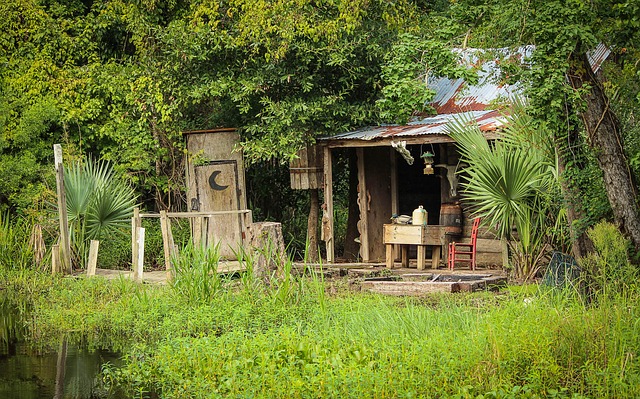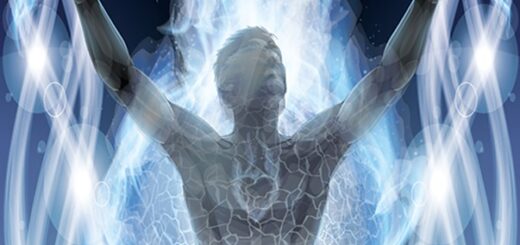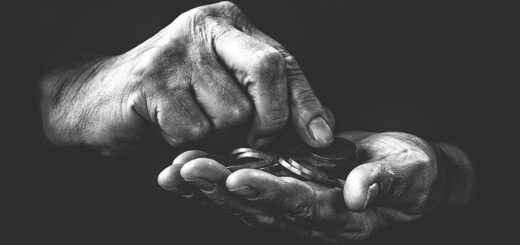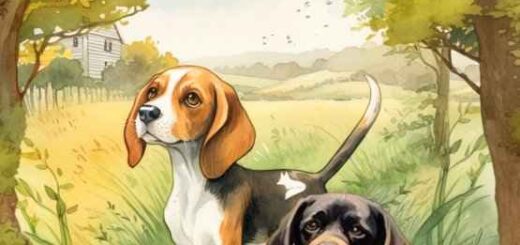Abraham by Frederick K. Foote, Jr.

Abraham by Frederick K. Foote, Jr.
It’s 2:30 A.M., and I’m driving down a one-lane dirt road at five to ten miles per hour with my high beams on. I have not driven this track to my grandmother’s in over a year. My rental sedan is having a rough time with the ruts, rocks, overgrowth, and debris.
Unforeseen delays and detours have bedeviled my journey home to Western Virginia.
I’m motoring through two-hundred-fifty acres of pristine wilderness. My great, great grandmother started acquiring this land. Each succeeding generation has added to this property. This land is in our blood, and our blood has watered our soil — Lynching and ambushes and worse come to mind. Some of us have always lived here. Many of us are buried here. All this acreage is a riot of wilderness by the decree of my eccentric family, except for five acres where we have a house, a well, outbuildings, gardens, and our family graveyard.
Hereabouts there are many, many farfetched stories and legends about us. We rarely have visitors or trespassers. We are isolated. But this is where we live. This is who we are.
My maternal grandmother, Pamba, acquired an additional hundred acres about five miles from here. That land is rented out for farming. That leased land pays the taxes on both properties.
Granny Pamba and my parents are buried here just like my sister, and I will be. I’m the executor of Granny Pamba’s estate. Family tradition requires that I, the oldest, occupy the land. We will move in two months, even if I don’t get my requested job transfer. My wife is dismayed at the isolation and brutal wilderness, but our kids and I are impatient to claim our heritage. I’ll be close to Granny Pamba again.
I remember my grandmother and I hiking through these woods, talking about any and everything. I can recall Granny Pamba as she puts a hand on my shoulder to stop me, freeze me in place. She points to a stalking black snake striking a green frog on the edge of a sparkling, clear creek. I remember her showing me a fox’s burrow and two kits dancing in the sun and shade; a silver ambushing eel hidden in a deep pool in the roots of a weeping willow; a bobcat ripping apart a rabbit and rampaging rutting deer.
I have walked my three girls through and through this land.
Eight-year-old, dark-eyed Aja, of the one-thousand serious questions, interrogates me endlessly.
Six-year-old Candit laughing and dancing between the trees, pickin’ wildflowers, and teasin’ bees.
Four-year-old magical, mystical, Dewi commanding the ants to follow, the leaves to ballet, the weeds to bow.
I look forward to visiting with my deceased but not gone relatives soon if my floundering Ford makes the next five miles.
I will prepare our house for the winter, and I should be back in Sacramento in three or four days. That is my plan, anyway.
When I was a Child
“Granny Pamba said, “Martin, what you got worth a nickel?”
“Five cents.”
“Boy, what you got worth a dime?”
“Nothin’ but time.”
And we would both laugh and finish weeding or picking or cleaning or cooking—God, how I miss her.
&&&
What the hell? My engine just died along with my outside lights and instruments. What can kill the battery and the motor at the same time without warning? Nothing I know of.
There are no bars on my cell phone. I have choices, wait, and see if the car recovers as mysteriously as it died; wait here until daylight, or walk to my grandmother’s house or walk back to the highway in the dark. Easy answer. I grab my jacket, step out of the car, stretch, and climb into the back seat to sleep until daylight.
I dream about my daughters.
Aja leans down to whisper to me, “Father, wake up. Follow the light. Time to give and get.”
Candit giggles, “Be the frog. Be the snake.”
Dewi takes a deep breath and blows out the words, “This is who you are.” In bright blue letters sprinkled with silver sparkles outlined in a shadowy black. She gives me a sad smile.
I follow the pale green light into the forest, surefooted, keen-eyed in the dark, fearless until the stink of death and corruption, decay and rot overwhelms me, stops me, gags me. The sick forest is dead or dying; every living thing is failing, flailing, falling into putrefaction. I vomit again and again. My eyes water. My nose stings. I’m chilled to the core by my fear.
“Boy, come to me.”
I know that voice. Who is that? I know that voice. I remember it. I stumble forward, hand over my mouth and nose.
Shit! A swarm of tiny flies descend on me, cover me with their obscenely sticky feet. I’m blinded to a halt. I smash them against my skin, wipe them away to be replaced by eager new reinforcements. I smash and wipe a dozen times before the flies gradually withdraw.
I lurch forward. The smell is changing, more funk than rot, more passion than pungent. I’m moving into a swamp. It smells like an orgy for man, beast, plants, earth, water. It is seducing and enticing and incredibly repulsive.
I’m knee-deep in the swamp, masturbating, moaning, screaming, crying in fear and lust. I’m coupling with something, something rough, unclean, ungodly. I will not open my eyes.
Something ruts with me — pulls me under the stinking swampy water. I die screaming and chocking.
I’m choking back to life — vomiting up vile swamp water in the backseat of my stranded Ford.
It is too painful to retch. My brain is on fire. My anus is ruptured. My throat gouged out. My eyes battered and blackened, fingers crushed. Ribs cracked. I’m covered in bruises, cuts, bites, and scratch marks.
The pain drags me under something thicker and fouler than the swamp water.
I’m back, back from my dream. I’m unharmed. There are no injuries, no bite marks or scratches, or black eyes or swamp vomit on the car seat and floor.
There is a message stamped in my mind, You, disobeyed. You came without Aja. Fetch her now.
I reply to nothing in particular, “Fuck you. I will never do that.”
Sunlight is breaking on the eastern horizon. I climb out, stretch for a few minutes, grab a bottle of water out of the car, and drink. I walk to a stand of cottonwood trees and relieve myself. I watch the sunrise awaken the forest.
What a horribly realistic dream. That’s what I tell myself repeatedly.
The car starts immediately. It is a slow and uneventful trip to our house.
When I was ten
Granny Pamba and I are on step ladders picking Bartlett pears. A sunny day. I’m in my shirt sleeves when the cold and ancient thing passes by and chills us to the bone. I didn’t see it, but I felt it.
“Martin, what was that?”
“Scary. Scary, that’s what that was.”
“Martin, did you pray?”
“I forgot.”
“Keep on forgetting. It is far older than your monotheistic myths. You do not pray to it.”
“Granny, I don’t understand—”
“Yes, you do. In the marrow of your bones and the closets of your soul, you know.”
&&&
I park in the roundabout and walk a hundred yards to the family graveyard. Always my first stop. And there is the voice from the swamp. The voice that I had heard even before I was born. My great-great-grandmother speaks, Boy, party animal that you are, it is time to bring her to us.
“No! That is a legend. We don’t do that anymore, if ever.”
Time to feed and be fed. Go on, boy. Bring her home.
“No! Not Aja. Never Aja. It’s a fable. We don’t sacrifice. We don’t make human sacrifices. Ever!”
Yes, Aja. It was always her from way before I was born.
“It is a test, right? Like with Abraham in the Bible?”
Martin, go quickly, return with your firstborn. Aja waits impatiently.
Back at home
“Aja, why are you giving your favorite toys and clothes to your sisters?”
“Mother, I won’t need them. I’m going home.”
“Home? You are home. What do you mean? This is your home.”
The three sisters sigh as one.
My Flight Home
We don’t do that. We probably never did. It’s symbolic, pre-Christian bullshit. We’re not superstitious savages. We aren’t – never were.
Boy, child, we were here before churches, writing, domesticated animals, planting crops.
“We’re not cannibals. We don’t eat our own kind.”
Every living thing is our kind. Child, would you have us starve? Chuckling.
“No, I won’t do it. You cannot compel me to do that.”
Yawn. I could, but I won’t. Aja will.
“Never!”
Besides, your frolic in the soup of life will give you offspring. You can spare one.
“That, that was not real. That was a dream.”
You bore me, Child. Rest. Close your mind and your mouth.
The flight attendant wakes me in Sacramento. “Sir, you had a very sound nap.”
I feel refreshed. Reborn. I get a Lyft home. All my bad dreams are fading into the mist of memory.
The girls greet me at the door. Aja, with her coat on, printed out tickets in her hand. I visit my wife sleeping so sound.
Aja says we must hurry.
Candit, tells jokes with sharp elbows.” It hurts to laugh at them.
As Aja and I leave, Dewi blows out more blue-black letters, “We are not Abraham. This is not a test. Never a test.”
Candit, kisses our cheeks at the door, “Aja, you always get the best parts. This is who you are. I love you, sister.”
This is what we are. This is what we are. Three thousand miles, five hours back to our home to reaffirm or reject that this is what we are.
THE END
Copyright Frederick K. Foote, Jr. 2020
























I’ve read a couple of Mr. Foote’s stories and really enjoy his poetic style. I especially appreciate this piece. It feel like a ledgend thast has been passed down through the generations. I look forward to more from him.